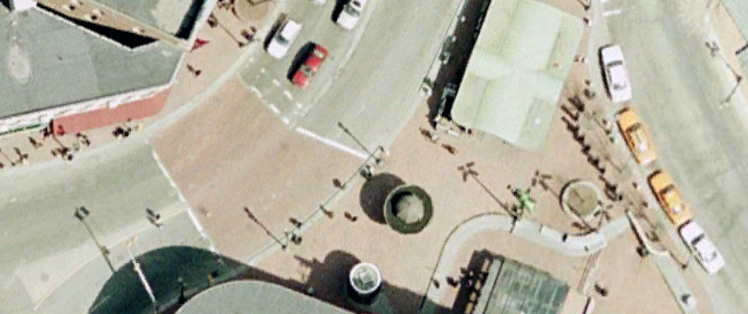The end of imagination
Looking dusty here. Tap, tap. Is this blog still on? Here’s an anecdote and a thought.
As much as a decade ago, I remember running into amazingly high resolution aerial imagery of Cambridge, Massachusetts. You could see people in this imagery, which was not so common on the web at the time. I explored Cambridge a bit via the map, as I am wont to do with any map in front of me. I found what looked like some busy spots, identified the famous Harvard University, and so on. It was a strange, unknown place—a city I only knew in person as a collection of buildings glimpsed from highways or from across the river in Boston, where I had been a number of times. It was mostly only a place on a map, and it was up to my imagination to picture what it was like to be there.

Aerial image of Harvard Square, dated 2001 in Google Earth.
Then, some years later, circumstances brought me to Cambridge as a resident. Now a further four years after that, I obviously have a much different image of the city. I love this place, and I’m glad I’ve come to know it well, but there’s no longer any mystique. I kind of miss imaginary Cambridge.
Part of maps’ broad appeal is that they are captivating as canvases for imagination. They can represent lands we’ve never seen, offering a simple lattice of information but requiring us to fill in the gaps in our minds. We can explore maps and “know” places to be as fantastic as our minds will allow. Ultimately, I think, it leads us to explore the places in reality, and it can be shocking when reality doesn’t match our imagined expectations. The shock is not necessarily bad and may even be pleasant (except when, say, imaginary beauty turns out to be a trash-strewn real world); but if you’re like me, you lament the demise of the place your mind invented, even if the reality that supplanted it is better.
As web reference maps move toward less and less abstracted representations of the world, some observers have begun to wonder whether people are losing the interest or need to go to explore real places and experience them in real life, because Street View can show you exactly what a place looks like, or Twitter maps can tell you exactly what people are talking about there, and so forth. I remain optimistic that modern maps will not be a substitute for reality, but rather will draw people in to experience what they know is happening in different places. The maps of old may have tantalized people with their sea monsters and blank spaces, but people didn’t stop climbing mountains when someone else had mapped their slopes with precision, and I didn’t avoid walking around town because I had already seen people-level aerial photos. Knowing what’s out there is as much of a draw as not knowing.
No, the victim in the march toward realistic maps is not real-world experience; the victim is imagination and a bit of the fun of reading maps. I don’t cease to imagine places when looking at a map. It’s just that my imagination is increasingly accurate. It used to be that for every place in the world there were actually two places: one in my mind and one on the ground. Soon, perhaps, there will be only one.
RIP, the last imaginary place on Earth.

Tagged exploration, imagination, place

3 Comments